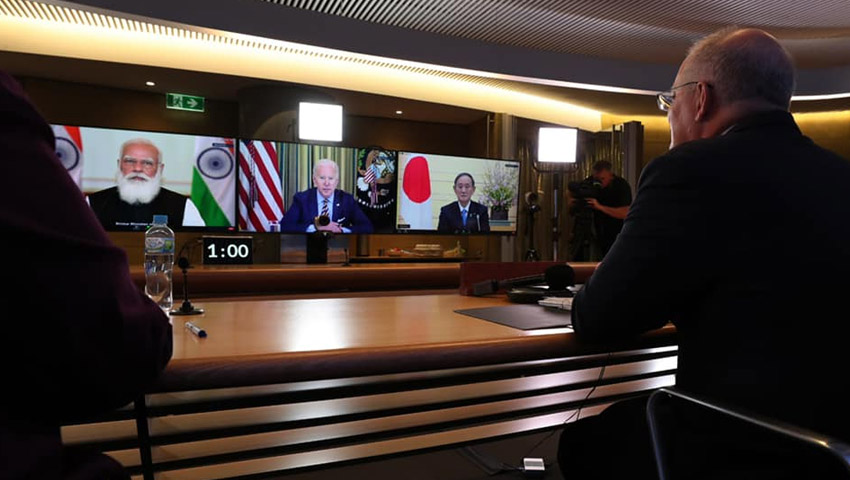Prime Minister Scott Morrison believes the Quad can lead a multi-layered recovery in the Indo-Pacific, but according to ASPI’s executive director, member nations have a “mountain to climb” before restoring regional stability.
To continue reading the rest of this article, please log in.
Create free account to get unlimited news articles and more!
Last week, leaders of the Quad nations — Australia, India, Japan, and the US — met virtually to explore new collaboration opportunities aimed at supporting the Indo-Pacific region’s recovery from the COVID-19 pandemic and responding to mounting political threats.
In a strong vote of confidence, Prime Minister Scott Morrison said this renewed commitment from the Quad would help bring about a “new dawn” in the region.
“History teaches us that when nations engage together in a partnership of strategic trust, of common hope and shared values, much can be achieved,” Prime Minister Morrison said in his opening address.
The prime minister compared the current global setting to the post-WWI era.
“When the world emerged from the Great War and our last global pandemic a century ago, it soon found a great depression and another global conflict, and it unleashed a poverty and a devastation that was unthinkable,” he added.
“As we emerge from this global pandemic, and the global recession, let us together create a different future. It is the Indo-Pacific that will now shape the destiny of our world in the 21st Century.
Morrison claimed the Quad has a new opportunity to work with regional neighbours to restore “peace, stability and prosperity”, helping to drive an “open, inclusive and resilient Indo-Pacific”.
“To respect and support their sovereignty, independence and security by upholding our values and supporting international law and to address the many challenges we face, from COVID to climate change,” he added.
“Know friends, that Australia, while looking to our friends in all of these tasks, we never leave it to our friends. We’ll do our share of the heavy lifting to lighten the burden for us all.”
However, Peter Jennings, the executive director of the Australian Strategic Policy Institute (ASPI) and a former deputy secretary for strategy in the Department of Defence, does not share Prime Minister Morrison’s optimism.
“[We] would do well to remember the village folklore that ‘the darkest hour is just before the dawn’,” Jennings writes.
“The Quad has a strategic mountain to climb to bolster faltering democracies in our region, to stop COVID-19 scything through countries that are ill-equipped to respond and, above all, to push back against the predatory wolf warriors of Beijing.”
Jennings flagged the individual challenges facing Quad nations, which could hinder collective efforts to restore regional stability.
“The Quad is a grouping of countries each of which, for different reasons, is reluctantly pressed to the Indo-Pacific strategic frontline,” he observes.
“President Joe Biden’s emphasis on working with the allies means that the US, the world’s security provider of choice, is tired of the burden and wants others to take some of the load.
“Of the other Quad countries, India is only just emerging from its non-aligned mindset and beginning to craft a world view that looks beyond its immediate borders. Japan’s ‘peace constitution’, and an assumed deep public aversion to military conflict, limits Tokyo’s capacity for forthright strategic leadership.”
As for Australia, Jennings claims Canberra has “talked a big game” but has been reluctant to bear the cost of “real strategic leadership”.
“Morrison promised his Quad colleagues that ‘we’ll do our share of the heavy lifting to lighten the burden for us all’,” Jennings continues.
“Only so much heavy lifting can be done with defence spending at 2.19 per cent of GDP, overseas development assistance at $4 billion and falling (prior to COVID-19) and one of the smallest diplomatic corps among G20 countries.”
Jennings contends that while the Quad’s commitment to meet regularly is a “substantial development”, the region has “singularly failed” to provide strategic leadership in recent years.
“The most important thing the new grouping can do is for the leaders to spur each other on to bigger, more imaginative policy efforts and not be slowed by bureaucratic process,” he adds.
Among the collaboration initiatives agreed to during last week’s virtual meeting was vaccine manufacturing and delivery throughout the region, particularly to the ‘last mile’ for ‘hard-to-reach communities in need’.
Australia committed to delivering ‘last-mile’ vaccines in Southeast Asia, in addition to supporting the rollout in Timor-Leste and nine Pacific island states.
“This is vital work, but we should have no illusions about the scale of the task involved,” Jennings warns.
He claims that this commitment could “absorb every Australian Defence Force aircraft, ship and unit”, as well as commercial aircraft from Virgin Australia and Qantas.
“Recall how stretched Defence was in the early 2000s to maintain a ‘brigade-plus’ formation of several thousand personnel in Timor-Leste to stabilise a country of (then) less than a million people,” he writes.
“There will be many ways to deliver vaccines including using private contractors and volunteer non-government organisations, but when it comes to hard-to-reach communities — consider the Papua New Guinea Highlands and Bougainville — it’s hard to see how Defence won’t be deeply involved.”
Jennings is also critical of Australia’s $100 million financial pledge for the provision of vaccines.
“Does this in any way meet the scale of the problem?” he asks.
ASPI’s executive director claims the vaccine strategy would help Quad member re-establish ties with regional neighbours, noting that in the midst of the COVID-19 pandemic, China continued to build relationships with regional partners, while Australia and its allies were dormant due to travel restrictions.
“This was clearly a tactic to build Chinese Communist Party influence at our expense. The Quad vaccine strategy demands that we urgently get back into the region,” he observes.
During the virtual meeting, Quad members also established a climate working group and a critical and emerging technology working group, the latter of which, according to Jennings, would “bring the Quad most openly into competition with China”.
The analyst noted there’s a pressing need to develop technology that is not dependent on Beijing or vulnerable to intellectual property theft.
“The importance of the Quad is that it holds open the possibility that Washington will include the allies as part of critical supply chains,” he writes.
“Australia’s interest in domestic production of air- and ship-launched missiles is much more achievable if we make it part of an international effort of key democracies.”
“The arrival of the Quad leaders’ meeting shows not just that a consensus has emerged about our dire strategic situation but also that we desperately need to do something about it quickly, not in defence acquisition timeframes measured in decades.”
Jennings concludes that while the pandemic was the core topic of discussion during last week’s conference, it was not the driving factor behind the meeting.
“This meeting happened for one reason only: the aggressive and destabilising behaviour of Xi Jinping,” he writes.
“Beijing might contemplate that as it tweets out its dismissive contempt for the gathering.”
Get involved with the discussion and let us know your thoughts on Australia's future role and position in the Indo-Pacific region and what you would like to see from Australia's political leaders in terms of partisan and bipartisan agenda setting in the comments section below, or get in touch with
Charbel Kadib
News Editor – Defence and Security, Momentum Media
Prior to joining the defence and aerospace team in 2020, Charbel was news editor of The Adviser and Mortgage Business, where he covered developments in the banking and financial services sector for three years. Charbel has a keen interest in geopolitics and international relations, graduating from the University of Notre Dame with a double major in politics and journalism. Charbel has also completed internships with The Australian Department of Communications and the Arts and public relations agency Fifty Acres.

 Login
Login








